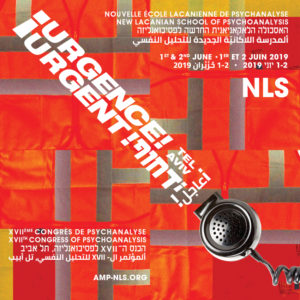The Argument
Subjective Urgency and Transferential Unconscious
In his “Prefaceto the English-Language Edition” of Seminar XI,[1] Lacan speaks of his urgent cases. The urgency that Lacan speaks about in this text from his very last teaching is not the subjective urgency that he speaks about in “On the Subject Who Is Finally in Question”, written in 1966.[2]
As Jacques-Alain Miller reminds us in his course,[3] when Lacan speaks of a subjective urgency in 1966 it is already a question of the formation of psychoanalysts: “[…] there will be some psychoanalyst who responds to certain subjective emergencies [urgences subjectives]”.[4] This text is contemporary with the “Proposition of 9 October”[5] on the invention of the pass. In this 1967 Proposition, Lacan uses the concept of the subject notably to introduce the matheme of transference on the basis of the subject supposed to know. “A subject” he says, “is supposed […] by the signifier that represents him”.[6] From which it follows that the algorithm of transference is deduced from the concept of the subject of the signifier. Urgency, as Lacan conceptualises it in these texts of 1966 and 67, is at Archimedean point of the establishment of transference. Situated at this logical moment of subjective destabilization, it accounts for the precipitation of the subject in the direction of haste, making it possible to put him to work. This “urgency” [urgence] is the traumatic moment when, for a subject, the signifying chain has been broken. The psychoanalyst is the one who listens to those who complain of an acute rupturing of the signifying chain.
The subjective urgency or emergency, this urgence subjective, is the point of departure that presides over the establishment of the signifier of transference in its relation to le signifiant quelconque – to “any” signifier. Lacan refers to what we call the demand of a potential analysand as an urgent request [la requête d’une urgence]. In the psychoanalytic sense, subjective urgency implies a call to the Other, to S2.
Urgent Cases and the Parlêtre
The “Preface to the English-Language Edition” of Seminar XI is a three-paged text that Lacan wrote in 1976 as an extension of his Seminar, The Sinthome; Miller even considers it to be this seminar’s last lesson. This short text is a new way of taking up his “Proposition” on the pass. It is for this reason that Miller considers it to be, in some way, Lacan’s last will and testament.
When he brings up the pass again at the end of his teaching, Lacan no longer uses the signifier “subjective urgency”, but that of “urgent cases”.
Other signifiers are also not found in this text. While “transference” finds its algorithmic definition in the 1967 “Proposition”, this signifier is nowhere to be found in the later text. And for good reason, for in his very last teaching, the subject supposed to know is itself thrown into question. The subject supposed to know is the hypothesis of the Freudian unconscious, the transferential unconscious. In this final text, the signifiers “knowledge”, “subject supposed to know” and “transference” no longer appear. In this regard, Miller points out that he prefers that we say that we come back from one session to the next because ça pousse, “it pushes”, ça urge, “it urges” rather than because of transference.
Knowledge is no longer there because Lacan no longer believes in it. He considers knowledge to be only a semblant, a hare-brained lucubration about lalangue.[7]
On the other hand, while knowledge produces nothing but lies, we find another signifier, that of “lying truth”.[8] And instead of the signifier of transference we find “these urgent cases”.
Admittedly, urgency here is, on the one hand, just as in 1967, what presides over the analysis, what presides over transference. In the analytic situation, the psychoanalyst is this person, this quelconque or “whomsoever” who embodies this place of address for analysands – these speaking beings that “run”[9]after the truth – the one who agrees to “pair” with these urgent cases. We meet an analyst when we are in a state of urgency. But, on the other hand, Lacan takes an additional step that goes beyond transference; there is another urgency. In analysis, there is always urgency, there is always something that pushes, that urges, that presses and that is beyond transference, even if one takes one’s time or lets it drag on.[10] Urgency is something that presses the parlêtre. Something of the order of “the urgency of life”, as Dominique Holvoet magnificently emphasized in his teaching as an AS[11].
“This indicates that there is a causality operating at a deeper level than the transference, one that Lacan characterizes as a level of satisfaction insofar as it is urgent and analysis is its means.”[12]
We run after the truth, says Lacan; this is what happens in free association, but truth cannot be caught by the signifier.
What is urgent for Lacan at the end of his teaching – the analytical urgency, that which pushes the parlêtre – consists therefore of running after truth, of pursuing the truth that harbours the real. But this truth cannot be captured with words. The urgency in question is the attempt to catch hold of a truth that can never be reached. This race to pursue the truth that we never can catch is what provides the satisfaction of these urgent cases, of the speaking bodies. This is why one can say that analysis is the means for this urgent satisfaction.
Satis, etymologically the Latin “enough”, constitutes the root of the signifier “satisfaction”, the “it is enough” of the pass. Consequently, satisfaction comes in two modalities: that of satis – “it is enough”, and that of a new way of knowing how to do with one’s real, with the non-resorbable jouissance.
In this final text, Lacan no longer says “the psychoanalyst derives his authorisation only from himself”,[13] because the subject produced by free association is thrown back into question. Instead, he emphasizes what is urgent, the impulse that pushes the subject to “hystoricize himself” [“s’hystoriser de lui-même”][14], namely to hystoricize himself without making a pair with his analyst. As you can see, in the very last Lacan, at the Archimedean point of the pass, what is at stake is urgent. The pass is done via the urgency of life.
Bernard Seynhaeve
Translated from the French by Philip Dravers









